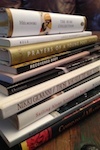 Poetry will never buy me bread or pay my rent. It will never pick up my children from school when I’m sick. It will not offer me a ride to the airport. Poetry will slip from my memory when I am old, phrases long memorized will most likely be buried under medical bills and compression hose and even so it will not forsake me completely. It will live deep in my cells, deep in my breath, deep in my history, and my making. It will buoy me when the water rises, when the dark falls, holding me with unseen hands, the memory of years past; words placed like pillars long forgotten.
Poetry will never buy me bread or pay my rent. It will never pick up my children from school when I’m sick. It will not offer me a ride to the airport. Poetry will slip from my memory when I am old, phrases long memorized will most likely be buried under medical bills and compression hose and even so it will not forsake me completely. It will live deep in my cells, deep in my breath, deep in my history, and my making. It will buoy me when the water rises, when the dark falls, holding me with unseen hands, the memory of years past; words placed like pillars long forgotten.
All in Bookish
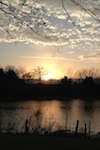 On this trip to Kentucky, I’m staying in a small cottage overlooking the pond at the back of Bethany Springs (the Thomas Merton Retreat Center), rather than at the monastery itself. Partly because of something I felt with renewed force when I finished reading Merton’s memoir last year. I am interested in neither a monastic life, nor an ascetic one. I’ll gladly stand with Jovinianus (and against St. Jerome, who identified this as an honest-to-God heresy, back in the year 393) in the declaration that abstinence from food is no better, in the eyes of God, than a thankful receiving of such. And you’ll find me much quicker these days to quote Mary Oliver’s “Wild Geese” than to agree with St Paul’s Greek-influenced dichotomy between spirit and flesh.
On this trip to Kentucky, I’m staying in a small cottage overlooking the pond at the back of Bethany Springs (the Thomas Merton Retreat Center), rather than at the monastery itself. Partly because of something I felt with renewed force when I finished reading Merton’s memoir last year. I am interested in neither a monastic life, nor an ascetic one. I’ll gladly stand with Jovinianus (and against St. Jerome, who identified this as an honest-to-God heresy, back in the year 393) in the declaration that abstinence from food is no better, in the eyes of God, than a thankful receiving of such. And you’ll find me much quicker these days to quote Mary Oliver’s “Wild Geese” than to agree with St Paul’s Greek-influenced dichotomy between spirit and flesh.
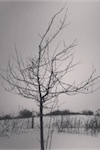 When I wash the dishes or grade the multiple choice quizzes, then, I try to cultivate my understanding of how those tasks fit into(yes!) the redemptive arc of history. Maybe I'm joining in God’s creative nature by creating babies and veggie stir-fry and quilts, by telling stories and painting with watercolors and making up silly songs and dances. Maybe I am making all things new by doing loads of laundry and getting dirty dishes to sparkle again. In each of these tasks, I am — hopefully — participating in God's plan to bring restoration to a broken world.
When I wash the dishes or grade the multiple choice quizzes, then, I try to cultivate my understanding of how those tasks fit into(yes!) the redemptive arc of history. Maybe I'm joining in God’s creative nature by creating babies and veggie stir-fry and quilts, by telling stories and painting with watercolors and making up silly songs and dances. Maybe I am making all things new by doing loads of laundry and getting dirty dishes to sparkle again. In each of these tasks, I am — hopefully — participating in God's plan to bring restoration to a broken world.
 Anyone who’s ever kept a journal — whether for brief reflections or recording prayers and petitions — can attest to writing as a powerful form of thinking, perhaps the most powerful. Even a very basic written account can provide order in a chaotic area, a structure when there seems to be little or none. Journaling helps move us toward greater internal clarity, cutting through the smokescreens of confusion or the ego. We may spot unhealthy patterns in our lives that we’ve blocked out, consciously or otherwise. Or we might work through a period of suffering in writing that spurs us toward the growth of the soul and invites us to live more fully — as Sarton puts it, moving “toward what we will become from where we are.”
Anyone who’s ever kept a journal — whether for brief reflections or recording prayers and petitions — can attest to writing as a powerful form of thinking, perhaps the most powerful. Even a very basic written account can provide order in a chaotic area, a structure when there seems to be little or none. Journaling helps move us toward greater internal clarity, cutting through the smokescreens of confusion or the ego. We may spot unhealthy patterns in our lives that we’ve blocked out, consciously or otherwise. Or we might work through a period of suffering in writing that spurs us toward the growth of the soul and invites us to live more fully — as Sarton puts it, moving “toward what we will become from where we are.”  Philip woke at eight the next morning and started the percolator. Around nine we decided that we wanted to treat everyone to coffee in their rooms, so I assembled the trays with pretty mugs and sprigs of holly and cream and sugar and, each carrying one, we ascended the stairs, grinning at one another like children. We delivered their coffee with bright greetings, and Philip started the fires in their rooms so that they could relax in bed for a while before breakfast. I told them we would eat in an hour: already the sacrosanct aromas of my mother’s Christmas Morning Breakfast Casserole, reserved for only the most special of occasions, was filling the air with invitation.
Philip woke at eight the next morning and started the percolator. Around nine we decided that we wanted to treat everyone to coffee in their rooms, so I assembled the trays with pretty mugs and sprigs of holly and cream and sugar and, each carrying one, we ascended the stairs, grinning at one another like children. We delivered their coffee with bright greetings, and Philip started the fires in their rooms so that they could relax in bed for a while before breakfast. I told them we would eat in an hour: already the sacrosanct aromas of my mother’s Christmas Morning Breakfast Casserole, reserved for only the most special of occasions, was filling the air with invitation.
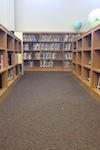 We love the idea of a room full of shelves, but surely the books want to be read, to be out in the world making connections. Do they whisper to the reader who gets lost between the shelves and then between the pages? And do the readers whisper back with each turn of the page? As a reader myself, I know how books have changed me. So likewise,does a book come back to the shelf somehow changed by the person who read it?
We love the idea of a room full of shelves, but surely the books want to be read, to be out in the world making connections. Do they whisper to the reader who gets lost between the shelves and then between the pages? And do the readers whisper back with each turn of the page? As a reader myself, I know how books have changed me. So likewise,does a book come back to the shelf somehow changed by the person who read it?
I have to believe that it does. A book that has been read and loved by a long chain of readers must carry that love with it until it simply falls apart.
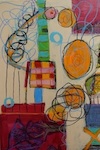 I have learned that on my own, in my response to the call of creation and the Creator, I am finite. I understand a few small truths and can reach only so far alone. I cannot teach myself all that I need to know and understand. When I find myself pushing the constraints of this finitude, I need the gifts of others to pull me through the fog into the next clearing. I will not reach my destination — nor even understand it — without them. I would like to. I long for independence and self-actualization. I want to do things on my own. But the fact is, I lack much.
I have learned that on my own, in my response to the call of creation and the Creator, I am finite. I understand a few small truths and can reach only so far alone. I cannot teach myself all that I need to know and understand. When I find myself pushing the constraints of this finitude, I need the gifts of others to pull me through the fog into the next clearing. I will not reach my destination — nor even understand it — without them. I would like to. I long for independence and self-actualization. I want to do things on my own. But the fact is, I lack much.
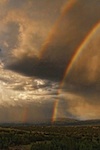 I had thought that this Catholic Mass would be so very different from the evangelical style of worship I was trying to take a break from. And I’d hoped, though I’d hardly admitted it to myself, that I might feel differently here, among the pillars and marble.
I had thought that this Catholic Mass would be so very different from the evangelical style of worship I was trying to take a break from. And I’d hoped, though I’d hardly admitted it to myself, that I might feel differently here, among the pillars and marble. But too much of it was familiar — the anemic guitar, the warbly singers, the optimistic lyrics. Sitting uncomfortably among the singing believers a burn of anxiety scrambled up my esophagus. I was irritated. The air conditioning irritated me. The music irritated me. The congregation irritated me. And my headache showed no signs of abating. Communion was coming, I knew that much from reading ahead in the program. I began to plan my escape.
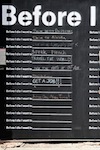 The shift happened slowly — over the course of the past five years as we added three children to our number and I found it more and more difficult to gather the energy to think clearly past 7:00 p.m. But it is unfair to blame entirely on parenthood the erosion of my thought life and the absence of any aspirations beyond surviving today. Perusing design blogs, Pinterest recipes, and perfectly staged photos of a stylized life is just easier than doing the real thing, and it always has been.
The shift happened slowly — over the course of the past five years as we added three children to our number and I found it more and more difficult to gather the energy to think clearly past 7:00 p.m. But it is unfair to blame entirely on parenthood the erosion of my thought life and the absence of any aspirations beyond surviving today. Perusing design blogs, Pinterest recipes, and perfectly staged photos of a stylized life is just easier than doing the real thing, and it always has been.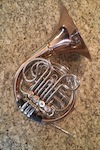 Music and writing seem to be flip sides of the same coin. I view my musical life and my writing life through very different lenses, but both have taken on the patina of parenthood. At least it’s a familiar feeling, like coming home. Home to a small oasis in a sea of dishevelment teeming with maple-syrup-encrusted children, a supportive spouse, and really excellent coffee.
Music and writing seem to be flip sides of the same coin. I view my musical life and my writing life through very different lenses, but both have taken on the patina of parenthood. At least it’s a familiar feeling, like coming home. Home to a small oasis in a sea of dishevelment teeming with maple-syrup-encrusted children, a supportive spouse, and really excellent coffee.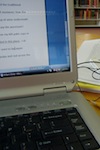 In a time threaded with liminality, all I have to offer is my finite, fallible self, my defenseless skin, and I try to hold onto my capacity to be faithful to the inexhaustible opening of time and whatever glories or agonies attend it. I think about the coming months, this precarious stretch, my parents and my infamous traveling Crock-Pot, the urgencies of art, stacks of sentences that require me to wrap myself around silence and suffering and joy's quiet possibilities so closely that I recognize myself in every note of grandeur and desolation.
In a time threaded with liminality, all I have to offer is my finite, fallible self, my defenseless skin, and I try to hold onto my capacity to be faithful to the inexhaustible opening of time and whatever glories or agonies attend it. I think about the coming months, this precarious stretch, my parents and my infamous traveling Crock-Pot, the urgencies of art, stacks of sentences that require me to wrap myself around silence and suffering and joy's quiet possibilities so closely that I recognize myself in every note of grandeur and desolation.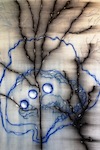 There’s an aloneness to art. We type, paint, sculpt, compose in isolation. We create to realize our theologies, philosophies, hurts, joys, doubts, faiths. We create to understand and work out our lives. And because we worship what we perceive to be the fount of truth and beauty (a God or gods, self, nature, universal energy, materials), we create to worship.
There’s an aloneness to art. We type, paint, sculpt, compose in isolation. We create to realize our theologies, philosophies, hurts, joys, doubts, faiths. We create to understand and work out our lives. And because we worship what we perceive to be the fount of truth and beauty (a God or gods, self, nature, universal energy, materials), we create to worship.
But while worship begins as a personal endeavor, it involves other people around us.
 So, in order for me to think justly about my world, I have to know my world the way my Creator does — namely, that I belong to my world and it belongs to me. And I belong more immediately and vitally to my immediate surroundings. As it relates to people, justice is rooted in God’s desire for people. In my opinion, that desire is never general and statistical but always particular and personal. So if I am to live more justly and foster truth, goodness, and beauty, I must localize. I must know, personally and particularly, the place and the people to whom I’ve been given.
So, in order for me to think justly about my world, I have to know my world the way my Creator does — namely, that I belong to my world and it belongs to me. And I belong more immediately and vitally to my immediate surroundings. As it relates to people, justice is rooted in God’s desire for people. In my opinion, that desire is never general and statistical but always particular and personal. So if I am to live more justly and foster truth, goodness, and beauty, I must localize. I must know, personally and particularly, the place and the people to whom I’ve been given.The Zen of Seeing
So rather than read further, which would’ve been much easier, I decided to take the ballpoint pen and lined notebook paper and draw what was right before me — and do it quickly, without proper paper or the need to prettify my work. I did opt for color because the green was so lush and bright with the afternoon sunlight shining through the leaves, so I found a couple of green markers and sat there in the sun happily coloring away, like I often did as a child. Did I capture the head of Romaine perfectly? Not at all. But did I begin to glimpse its infinite beauty, the curtain of one leaf folded inside another, the veins like tiny circuitry? I did, indeed.
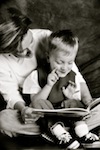 From our hastily packed bag, I pulled out the tattered green copy of the book we had been reading as a family. Curled up tightly on the hospital bed next to my pale, tired boy, I flicked through the yellowed pages to find our place. Yes, that was it. A pile of neatly arranged feathers, topped with two carefully crossed crow’s feet and a beak, had been found in the center of the barnyard. Jinx the cat had been framed. As we read together in that hospital bed, what took place was a holy alchemy. Ordinary words on paper were transformed into extraordinary glimpses of hope.
From our hastily packed bag, I pulled out the tattered green copy of the book we had been reading as a family. Curled up tightly on the hospital bed next to my pale, tired boy, I flicked through the yellowed pages to find our place. Yes, that was it. A pile of neatly arranged feathers, topped with two carefully crossed crow’s feet and a beak, had been found in the center of the barnyard. Jinx the cat had been framed. As we read together in that hospital bed, what took place was a holy alchemy. Ordinary words on paper were transformed into extraordinary glimpses of hope.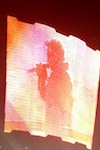 At every turn, I find that I know and believe that artists matter significantly for the ways they capture a culture, how they generate artifacts that point to the values and priorities and perspective of a generation, and how they wave the flag on overlooked issues. But over the past few months, I have wanted to know better why the poet, specifically, matters. Not just those who write and publish poems literally, but those who serve as a voice in the wilderness — the seers, the prophets, those who get something that others can’t yet get.
At every turn, I find that I know and believe that artists matter significantly for the ways they capture a culture, how they generate artifacts that point to the values and priorities and perspective of a generation, and how they wave the flag on overlooked issues. But over the past few months, I have wanted to know better why the poet, specifically, matters. Not just those who write and publish poems literally, but those who serve as a voice in the wilderness — the seers, the prophets, those who get something that others can’t yet get.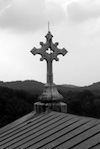 Each of us recites a poem. We talk about current events, and tell stories from our personal journeys. The sound of crickets is broken by the bell tolling for Compline. We realize we’ve lost track of time, so we rush Brother Paul back to the Abbey for the service.
Each of us recites a poem. We talk about current events, and tell stories from our personal journeys. The sound of crickets is broken by the bell tolling for Compline. We realize we’ve lost track of time, so we rush Brother Paul back to the Abbey for the service.
Later, I will recall the blend of bread and wine and storytelling with prayer and the observing of silence. The rhythm of the afternoon, I think, might be a good model for the cadence of Antler’s work.
 We wanted to respond by making, not just critiquing or even experiencing. In fact, we spent our four-hour drive home that evening discussing work and beginning to outline several collaborative projects. We were intellectually and emotionally exhausted, yet enlivened for work (our various cups of coffee throughout the day helped, too). These paintings cause the viewer to take a life-giving, culture-making posture before she even realizes that she has begun to stand. This is the generative nature of good art/work.
We wanted to respond by making, not just critiquing or even experiencing. In fact, we spent our four-hour drive home that evening discussing work and beginning to outline several collaborative projects. We were intellectually and emotionally exhausted, yet enlivened for work (our various cups of coffee throughout the day helped, too). These paintings cause the viewer to take a life-giving, culture-making posture before she even realizes that she has begun to stand. This is the generative nature of good art/work.Interview Series: MAKING — A Conversation with Carey Wallace
Art in all its forms is intimately connected with every aspect of all lives. We sing when people die. We dance when they get married. Even sports events and video games incorporate music, dance images, theater. The things I make are only my participation in that constant, unstoppable swirl of creation. This world is already beautiful and good. It’s just a question of where we choose to look.
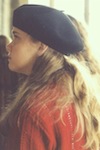 Paris never slept, as I found to my pleasure when I returned at 21 and took up residence in a crummy hostel. Upland, in contrast, rarely seems to wake. But you can see the stars here like you never can in Paris, and the lonesome quiet of the prairie has started to feel like a companion. Maybe even a friend.
Paris never slept, as I found to my pleasure when I returned at 21 and took up residence in a crummy hostel. Upland, in contrast, rarely seems to wake. But you can see the stars here like you never can in Paris, and the lonesome quiet of the prairie has started to feel like a companion. Maybe even a friend.















